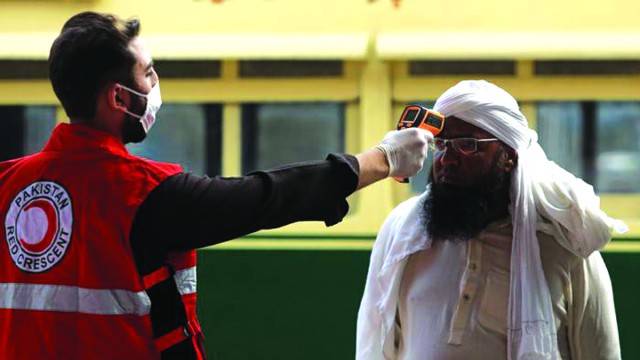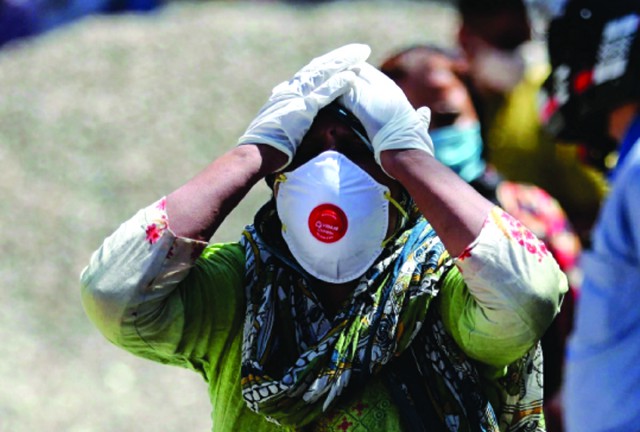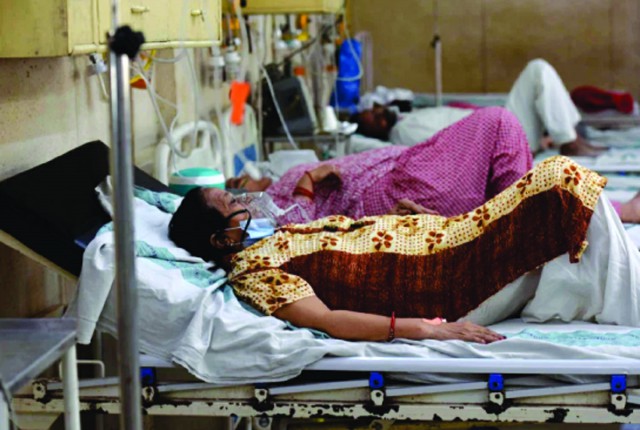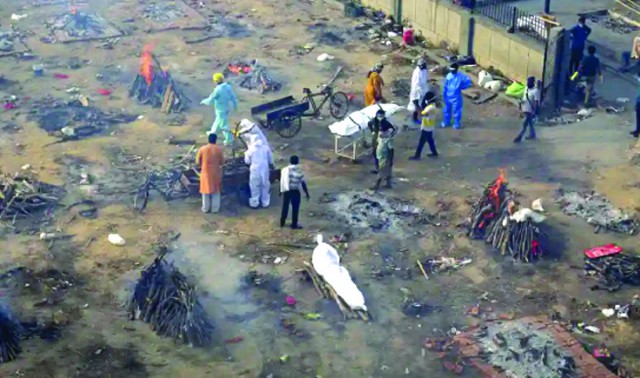
When New York became the epicentre of the pandemic exactly one year ago, I, like so many others, spent most of my time indoors and on calls. For the first time in living memory, everyone was home and no one had anything better to do, so I caught up on relationships far and wide. The conversations were mostly a distraction from the unending spectre of doom that was pervading the streets outside like a dark fog, but I took comfort in the comforting.
“It must be so scary to be there right now,” friends from Pakistan would say. And it was. The virus was everywhere, morgues were filling up until bodies had to be piled up in makeshift tents, the federal government was conspicuous only in its complete absence, and things like doorknobs had suddenly become as deadly as bullets.

“Thank you, thank you,’ I would say, swaddled in layers of victimhood and fleece. “But it’s bad everywhere right now I suppose.”
“It’s not so bad here right now,” would be the reply, usually with a defensive quote about why so few people were dying in South Asia. The newspapers posited that the low death rate could have been because the populations were youger, stronger, less obese and inoculated by robust immune systems used to dealing with threats, but no one really knew why.
After a while, people stopped wondering.
As the months of the quarantine lockdown progressed I began to get into frequent arguments with Pakistani friends and family who seemed unwilling or unable to grasp the seriousness of the threat. I didn’t understand why they were comfortable attending funerals, or going to gyms while I was still a panicked mess unable to do much to eat and worry.

They would dismiss my concerns by saying that “America was different”, that we know so little about the virus that it was entirely possible hot places like Pakistan were not as badly affected as America, or the UK, or Europe, or Brazil. A few months later, when South Asia gave up any pretense of a lockdown at all, I stopped arguing altogether and simply braced myself.
People told me I was being too rigid in my quarantine during the months I was in Lahore myself. A word to the wise: “But I’ve already had Covid” isn’t nearly as comforting a mantra as you think it is. I avoided meeting nearly anyone my entire time there. There wasn’t a day, not a single one, that I wasn’t scared for the people I love. That fear only began to abate slightly once people began getting the vaccines across the world. Finally, I thought when I heard people were getting jabbed in Lahore, we’re nearly out of this.
I noticed the uptick in funeral messages three weeks ago. Posts from desi friends both sides of the border read like a list of never ending obituaries. A friend’s father, uncle, co-worker, aunt, sister-in-law, acquaintances, brothers, sons. Covid wards filling up, oxygen running low, raspy voices, whispered goodbyes, solitary departures.

Last week my own first cousin succumbed to Covid-related pneumonia. He left behind two children already reeling from the loss of their mother a few years ago. As my father told me details of the funeral arrangements, I was filled with an ice-cold rage for anyone that had pretended we were out of the danger, at anyone who had decided that delusion was a better medicine than policy, who had the temerity to deny science and the gall to claim that that served anyone purposes but their own.
I understand that Covid lockdowns cost people in places like Pakistan more than simply idle time. Shutting down whatever dregs of an economy we have left in the country means millions go hungry or worse. And yet I wonder:
Why did a government that thought crowd-funding a water dam like it was some kind of village fete was a possibility, couldn’t at least try to come up with a workable solution for a lockdown?
So much of our hubris over Covid came from those early days when Pakistanis and Indians convinced ourselves that it was a foreign concern. It’s the same ostrich-in-the-sand approach the countries use for nearly everything.
But eventually the sand catches up. As will the bodies. And what enrages me more than anything is that we always knew that.
Write to thekantawala@gmail.com

“It must be so scary to be there right now,” friends from Pakistan would say. And it was. The virus was everywhere, morgues were filling up until bodies had to be piled up in makeshift tents, the federal government was conspicuous only in its complete absence, and things like doorknobs had suddenly become as deadly as bullets.

“Thank you, thank you,’ I would say, swaddled in layers of victimhood and fleece. “But it’s bad everywhere right now I suppose.”
“It’s not so bad here right now,” would be the reply, usually with a defensive quote about why so few people were dying in South Asia. The newspapers posited that the low death rate could have been because the populations were youger, stronger, less obese and inoculated by robust immune systems used to dealing with threats, but no one really knew why.
After a while, people stopped wondering.
They would dismiss my concerns by saying that “America was different”, that we know so little about the virus that it was entirely possible hot places like Pakistan were not as badly affected as America, or the UK, or Europe, or Brazil. A few months later, when South Asia gave up any pretense of a lockdown at all, I stopped arguing altogether and simply braced myself
As the months of the quarantine lockdown progressed I began to get into frequent arguments with Pakistani friends and family who seemed unwilling or unable to grasp the seriousness of the threat. I didn’t understand why they were comfortable attending funerals, or going to gyms while I was still a panicked mess unable to do much to eat and worry.

They would dismiss my concerns by saying that “America was different”, that we know so little about the virus that it was entirely possible hot places like Pakistan were not as badly affected as America, or the UK, or Europe, or Brazil. A few months later, when South Asia gave up any pretense of a lockdown at all, I stopped arguing altogether and simply braced myself.
People told me I was being too rigid in my quarantine during the months I was in Lahore myself. A word to the wise: “But I’ve already had Covid” isn’t nearly as comforting a mantra as you think it is. I avoided meeting nearly anyone my entire time there. There wasn’t a day, not a single one, that I wasn’t scared for the people I love. That fear only began to abate slightly once people began getting the vaccines across the world. Finally, I thought when I heard people were getting jabbed in Lahore, we’re nearly out of this.
Last week my own first cousin succumbed to Covid-related pneumonia. He left behind two children already reeling from the loss of their mother a few years ago. As my father told me details of the funeral arrangements, I was filled with an ice-cold rage for anyone that had pretended we were out of the danger, at anyone who had decided that delusion was a better medicine than policy, who had the temerity to deny science and the gall to claim that that served anyone purposes but their own
I noticed the uptick in funeral messages three weeks ago. Posts from desi friends both sides of the border read like a list of never ending obituaries. A friend’s father, uncle, co-worker, aunt, sister-in-law, acquaintances, brothers, sons. Covid wards filling up, oxygen running low, raspy voices, whispered goodbyes, solitary departures.

Last week my own first cousin succumbed to Covid-related pneumonia. He left behind two children already reeling from the loss of their mother a few years ago. As my father told me details of the funeral arrangements, I was filled with an ice-cold rage for anyone that had pretended we were out of the danger, at anyone who had decided that delusion was a better medicine than policy, who had the temerity to deny science and the gall to claim that that served anyone purposes but their own.
I understand that Covid lockdowns cost people in places like Pakistan more than simply idle time. Shutting down whatever dregs of an economy we have left in the country means millions go hungry or worse. And yet I wonder:
Why did a government that thought crowd-funding a water dam like it was some kind of village fete was a possibility, couldn’t at least try to come up with a workable solution for a lockdown?
So much of our hubris over Covid came from those early days when Pakistanis and Indians convinced ourselves that it was a foreign concern. It’s the same ostrich-in-the-sand approach the countries use for nearly everything.
But eventually the sand catches up. As will the bodies. And what enrages me more than anything is that we always knew that.
Write to thekantawala@gmail.com


